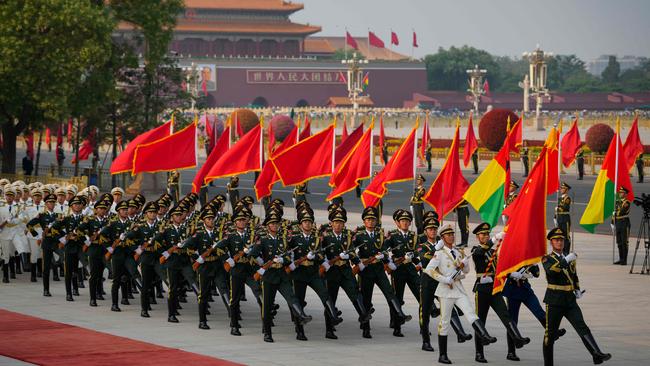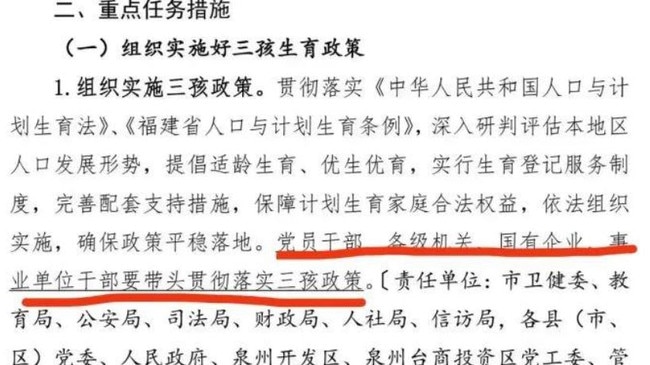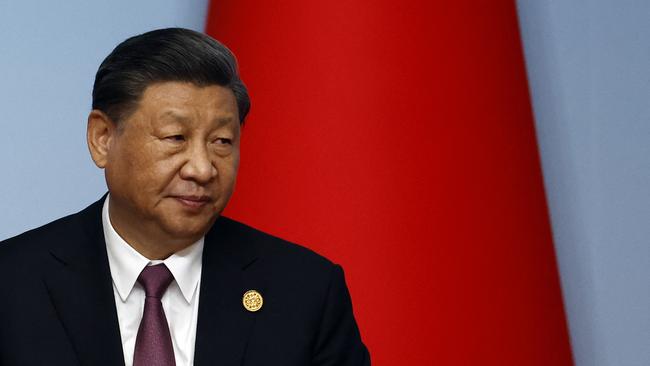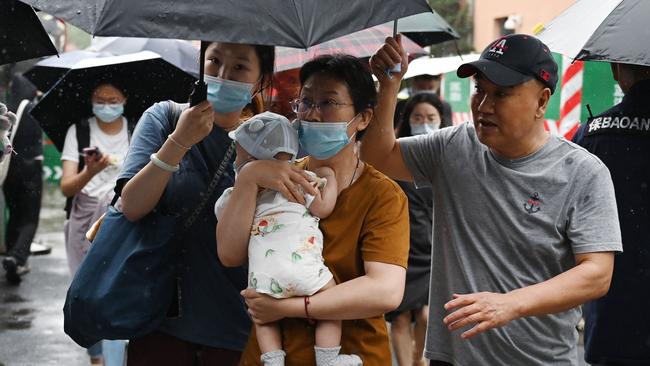‘Worried’: Leaked government document reveals China’s shock baby plan
One tiny detail in a leaked government document has revealed China’s massive backtrack in one key area, setting alarm bells ringing.
Economy
Don't miss out on the headlines from Economy. Followed categories will be added to My News.
A leaked draft document has revealed China plans to coerce government officials and employees into having more children.
Developed countries across the globe are experiencing a steadily falling birthrate, with a report from consultancy firm KPMG this week revealing Australia is in the midst of a “baby recession”.
In 2023, the total number of births fell by 13,000 to 289,100 – the equivalent of just 1.6 children per woman. The number needed for a population to sustain itself is 2.1.
Sydney was the worst performer, with a decline in deliveries of 8.6 per cent.
Only the nation’s capital, Canberra, bucked the trend.
It’s a performance Beijing hopes to emulate, with a bureaucrat-led baby boom.
Its national fertility rate is currently estimated at 1.45 children per woman.
But China’s much further along the population-bust bell curve than Australia.
Its population is already contracting.
As its citizens age, the labour force is shrinking.
And that means its social, economic and military ambitions are coming under increasing pressure.
It’s something the Chinese Communist Party (CCP) realised it must address in 2015 when it abandoned its long-enforced one-child policy.
But the nation’s birthrates have only continued to decline since.
Now, a leaked draft document circulating on Chinese social media reportedly details plans to “organise and implement” Chairman Xi Jinping’s 2021 “three-child” policy among party officials and municipal employees.

The document states among its “key tasks and measures” is the need for bureaucrats at all levels to lead by example.
“Party members and cadres at all levels of government agencies, state-owned enterprises, and public institutions should take the lead in implementing the three-child policy,” the Chinese Sina news service reports.
“This has aroused public concerns about ‘disguised forced’ childbirth.”
A public service baby factory
The Quanzhou Municipal Health Commission confirmed to Sina the document was authentic, blaming “negligent” staff for its early release.
“Later, the relevant departments of Quanzhou City may publish it in due course according to the situation,” it adds.
Quanzhou is in the southeastern corner of Fujian Province, opposite Taiwan.
It’s one of China’s most prosperous regions.
According to Sina, the province’s population of 8.9 million grew by 4000 in 2023.
“The document lists three main areas of work,” the Sina report states.
“First, organise and implement the three-child policy;
“Second, cancel fertility restrictions, including cancelling social maintenance fees, cleaning up policy documents and social restrictions that are not suitable for the population development situation;
“Third, improve the population service system, improve the overall solution for the ‘old and young’, and establish and improve the population service system covering the life cycle.”
But there was a fourth element that attracted public attention.
“In the section on ‘organising and implementing the three-child policy’, the mention of party members and cadres taking the lead in implementing the three-child policy made some netizens feel uncomfortable,” the Sina report reads.
“Some people worried that it would become a disguised forced birth of three children.”
Quanzhou isn’t the only Chinese city that has considered enforcing the three-child policy.
Jiemian Financial News reported that the Xiangtan District in Xiangtan City, Hunan Province, had already taken similar steps.
“We call on party members and cadres to publicise and guide, take the lead in implementation, and consciously implement the country’s optimised fertility policy, and make positive contributions to promoting the long-term balanced development of the population,” the Xiangtan District CCP administration proclaimed in November last year.

Fertility fight
Beijing, like Canberra, is struggling to come to grips with the underlying cause of its baby recession.
Housing prices, cost of living, excessive “out of hours” work and a lack of accessible childcare are what its struggling families complain of most.
But Chairman Xi Jinping appears to feel something is wrong with his women.
In November last year, Chairman Xi told an assembly of the All-China Women’s Federation: “We need to actively cultivate a new culture of marriage and child-bearing” as an essential contribution to the “rejuvenation” of his nation.
“We need to guide women to play their unique role in carrying forward the traditional virtues of the Chinese nation, establish a good family tradition, and create a new trend of family civilisation,” Xi said.
“Only with harmonious families, good family education, and correct family traditions can children be raised and society develop in a healthy manner.”
As a result, the party last year ordered government family planning officials to “intervene” and reduce the number of abortions among teenagers. They must now campaign for “respecting the social value of childbirth, advocating age-appropriate marriage and child-bearing, as well as optimal child-bearing and raising”.
“The new marriage and childbirth culture must be incorporated into village regulations, and content that is inconsistent with this must be revised,” the family planning directive adds.
The Chinese Jiemian/Sina News service is unusually frank in reporting negative social media reactions to the Quanzhou plan. One quote about the leaked document reads: “It was a veiled reference to forcing people to have three children”.
“Those who do not comply “can forget about getting promoted or getting rich,” another commentator noted.
RFA’s Mandarin language service reports concern at the financial burden lower-ranked CCP members and government workers would face.
“It reminds me of what happened to a lot of my classmates … who are now couples with four elderly parents and two kids who have to make loan payments, raise their kids and also take care of medical treatment and health issues for their elders,” a blogger wrote.

Quality control
China’s Central Committee, whose 205 members are responsible for establishing national policy, held its Third Plenum (five-yearly assembly) under Chairman Xi Jinping earlier this month.
“A sound system will be instituted to provide full life-cycle population services to all in order to promote high-quality population development. China will refine the policy system and incentive mechanisms for boosting the birthrate and strive to build a childbirth-friendly society,” Xinhua reports the Plenum as ruling.
And the “high-quality population” may be behind the CCP’s recent push for increased prenatal genetic testing.
“China continues to make efforts to improve comprehensive prevention and treatment capabilities for birth defects with the nationwide infant mortality rate and the mortality rate of children under 5 years old due to birth defects both decreasing by over 30 per cent compared with five years ago,” a CCP-controlled Global Times editorial published earlier this month reads.
China’s Maternal and Infant Health Care Law of 1994 instructs doctors to prevent marriage if someone has a mental disorder or severe disease. In the case of hereditary problems, a couple must consent to long-term contraception or sterilisation.
The law also states that if prenatal testing reveals a disease or deformity, an abortion is expected.
This has some members of the community eyeing proposed new government-funded fertility treatment programs, including egg storage, with suspicion.

But fertility intervention programs are not all Beijing is considering.
“Issues such as childcare subsidies, housing purchase discounts, and holiday care have been discussed from time to time,” the Sina report reads.
It adds that the party is investigating a broad range of options, “including a more complete policy and regulatory system to promote long-term balanced population development, improved service management, moderate fertility, improved population structure, good birth and parenting, early childhood education services that are in line with the people’s needs for a better life, significantly enhanced family development capabilities, and significant progress in the all-round development of people.”
A Monday Global Times article states work is already underway to establish a “child-bearing and child-rearing support system”.
Progress so far includes “a number of policies rolled out in localities across the country, including extending maternity leave to 158 days or longer, raising childbirth allowance and child-rearing subsidies, and providing more professional and affordable babysitter services at childcare institutions,” it adds.
Jamie Seidel is a freelance writer | @JamieSeidel
Originally published as ‘Worried’: Leaked government document reveals China’s shock baby plan





